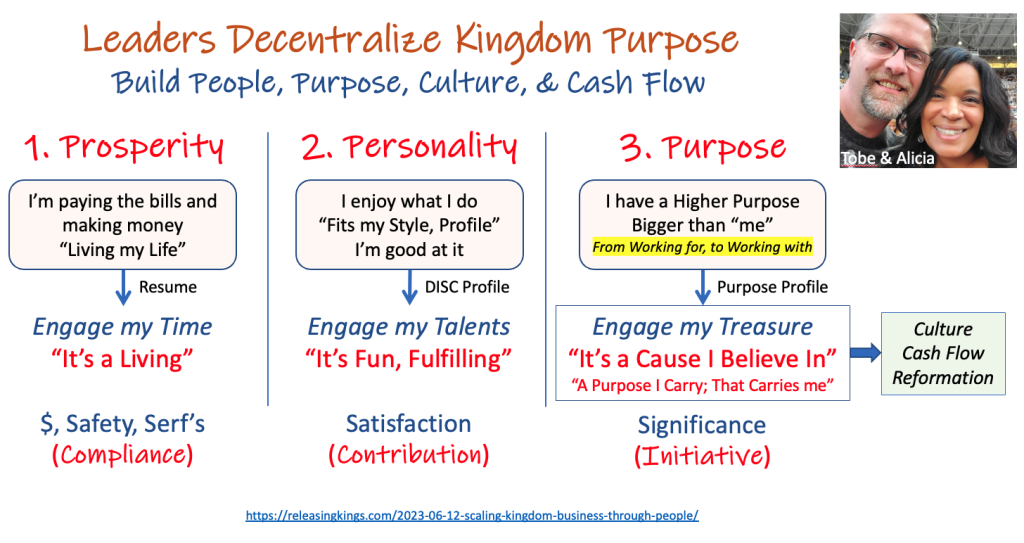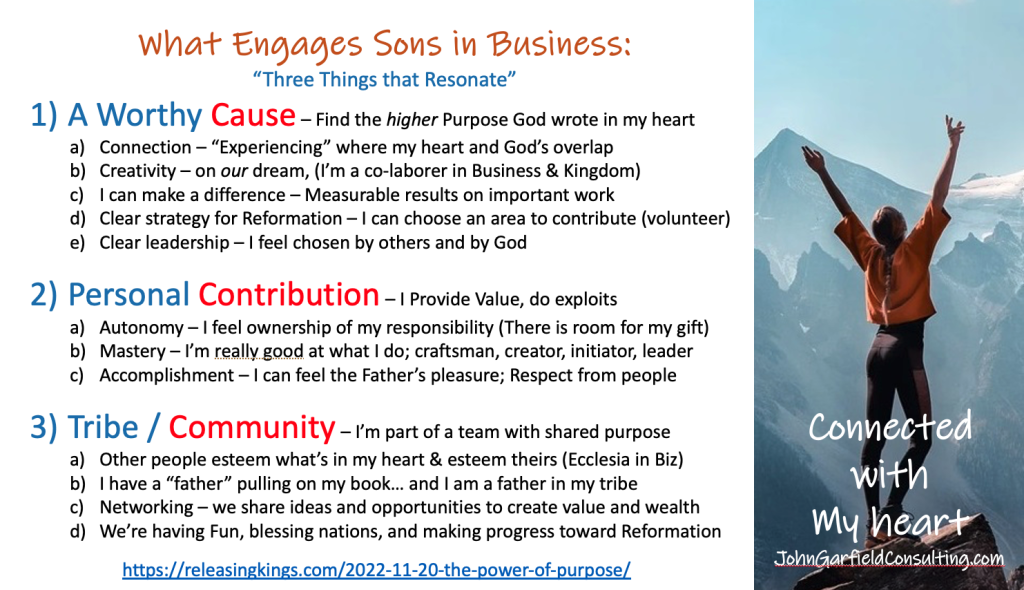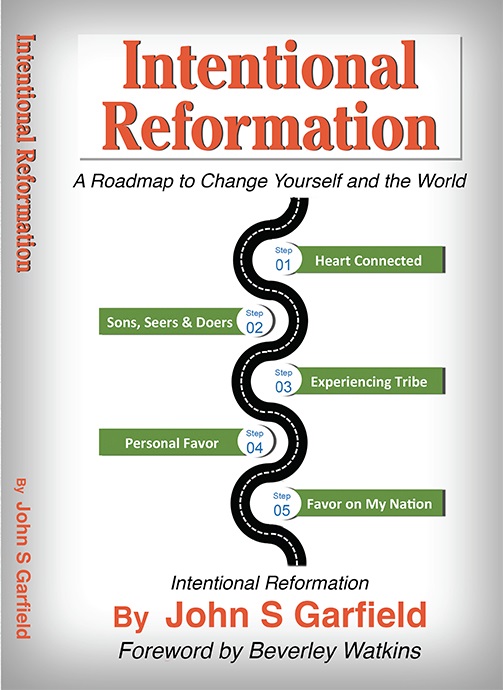When someone on your team leaves the business, it can be painful, feel like betrayal, and become the source of accusations; “What did I do wrong?” The cost in lost wages to the individual and training their replacement is equivalent to two year’s salary. It’s inevitable that people will move on for good reasons or bad. But in a Kingdom business we would like those moves to be graduations instead of cat fights.
There are three levels of engagement in a business that has a Kingdom purpose. So, the first question is do you have a compelling Kingdom Purpose that is evangelistic for new hires and a mission for the rest of us? We can help you if you don’t have a direction. Those C-Suite motivation posters don’t cut it BTW! We’re talking about a purpose that is prophetically correct, that ignites hearts. Here are the three levels of engagement:
Level #1 (Money) – I’m working “for” the paycheck and don’t have any higher purpose. This first category is serfdom, not sonship. We all start at this level, but we can’t be expected to stay in compliance motivation for a lifetime. People are just not designed by God to drift in meaningless (for them) drudgery. We get zero initiative and limited quality from this class of freshman because their hearts on not on board with anything.
Redeeming Serf’s – Whether saved or unsaved, hearts will resonate with your purpose if it’s alive. Sharing it with them will help them engage. Using 1-on-1 conversations about their purpose will help you “hear” where their book is leading. It is the priestly job of Kingdom leaders to know and care about what is in the hearts of their people. It’s part of the lifestyle of creating a Kingdom Business culture. Ecclesia is built around shared purpose. Kingdom CEOs are slowing awakening to the reality that cash flow and Kingdom culture are two wings of the same airplane.
Level #2 (Personality) – People who stay and become proficient at their work often find a niche they enjoy and find fulfilling. It fits their personality, gifts, and talents. We’re tempted to declare victory when team members reach this level. People do want to contribute. However, there is a heart motive behind this level of engagement that is not necessarily engaged with Kingdom purpose. They have a purpose it just may not be yours and it may be entirely introverted to satisfy their own needs; the Kingdom is not first! People at this stage will either join your Kingdom purpose or eventually find a reason to engage in their own. They can be perceived as obstinate and insubordinate unless you’ve taken the time to hear the purpose behind their actions.
Redeeming Personalities – When talented contributors drift away from the Kingdom purpose, we must lovingly confront the source of divergence. If we can hear their why, it may not be wrong, just different. If so, a graduation is in order instead of an execution. Help them move on with their lives and into their own purpose. Make it a template in your culture so that everyone knows you have their back.
There may not be a clear purpose or a happy ending in every case. As a leader, you either terminate them or risk losing the atmosphere in your business culture. The Holy Spirit will not be present when there is a different spirit or an opposing spirit disparate from your Kingdom purpose. It’s a cancer that will cost you the culture! Sowing discord to assemble the victim mentalities and justify an alternative cause or course comes from a controlling, manipulative spirit that the Lord detests (Pro 6:6-19). Make purpose the deciding factor; performance is symptom of a heart condition, not a cause.
Level #3 (Purpose) – Build your business around people who share Father’s purpose. Get their purpose in writing and make it the preamble to their job description. Update both regularly because they will change as the person and the business grows. They will appreciate your respect to acknowledge the space and the overlap between their and your Kingdom purpose. It feels like love, and they will pay you back with loyalty. Use 1-on-1’s to gain clarity on their purpose and how they share yours. Then, move on to performance, goals, KPI’s, and promotional opportunities. Gallup finds that a manager having one meaningful conversation per week with each team member develops high-performance relationships more than any other leadership activity. If you can “see” their book and where their story is headed, you can dream and pray with them about their exciting future. Your business can grow your people; disciple and ordain – Ecclesia in Business is built around shared Kingdom purpose.
Creating Culture – One of key attributes of The Priestly Side of Business Leadership is sonship; the ability to build the business culture around shared, prophetic purpose. We’re really in the business of tapping into the anointing that God has wired into our team. We not just looking for “their” gifts and talents. The goal is to release co-laboring, what God can do through them is a whole new level. When that happens, these sons and daughters you nurture will become Joshua’s and Caleb’s and Deborah’s who will build a new wing on your business. Kingdom culture is good for, even necessary, for healthy cash flow. At the highest level, we’re recognizing and leveraging their anointing and contribution toward Reformation of cities and nations. The connection between your Kingdom Purpose and Reformation is intentionally communicated to your team. Their strategic role in Reformation via your business can be known and celebrated.

There are two important tools we use to help CEO’s know purpose and Build culture:
- Purpose Profiles get prophetically correct purpose in writing; we start with the CEO and build it into the culture for everyone on the team.
- And the Kingdom Business Culture Field Guide will take the mystery out of building an Ecclesia in your business.

Cutting Room Floor
Unity in Diversity – God has written Kingdom purpose somewhere in the hearts of people, both saved and unsaved. They will resonate with your purpose at different levels. When people chaff against our Kingdom Purpose there are several steps we can take:
- Invite their specific comments on how to improve your purpose profile. We get our purpose in writing and invite our leadership team to improve it. Mine is here as an example. Let people know it’s always a snapshot in time and prophetic improvements from Heaven are always welcome. We’re not the only sons who hear from God!
- Have a conversation around their purpose and try to get a prophetic sense of what God has wired into their heart. If they don’t like your purpose, shift the emphasis to what is in their heart. Purpose Profiles are best used proactively before there is a problem. Use 1-on-1’s for the leadership team and the entire staff to define individual purpose should be the goal in a Kingdom culture.
Most of us have come from a religious setting where “unity” was the boundary. As we discussed in the blog, sowing discord must be confronted. But instead of insisting on unity in the sense of requiring allegiance and conformity, we are celebrating diversity and building our value around Kingdom purpose. If you are not resonating with the corporate purpose, what is your purpose? What would you rather do? Can you do it within our structure or is it best to start your own business or get a different job?
Kingdom purpose in a business is broad enough to be carried by different personalities. The same goal can be filled in very different ways by very different people. The second thing that is challenging for traditional leaders is that purpose is a moving target. Father’s mercies and manna are new every day. Our written purpose will need revisions; those improvements may come from people with a different perspective. Allowing others to carry different wings of the business that God has given them is a big part of the genius of Kingdom. Jesus is the King of kings, not the King of serfs.
Do Your Job – Traditional industrial age management philosophies are prone to be mechanistic. Their focus is on results. Soft skills is a derogatory term for culture, counseling, and caring. Managers often lack intrapersonal and interpersonal skills and the heart to know and love people, so they resort to KPI’s, cost, scope, and schedule. In their view, HR and employee concerns are staffed with women who have the time and patience to mother malcontents and funnel them through a legally defensible termination process.
We really are in different Kingdom age. Leaders who can’t adopt their skill set will be unable to compete with managers who are both Priest and King. Spiritual realities exist right next to practical realities, and we must navigate both in business. Secularism is a dying philosophy, increasingly irrelevant, and growing poorer by the day because of diminishing value and cash flow. We are all in the people business and all our people were created with spirits and hearts. Tap into their anointing, and they will do much more than their job. Business is a greenfield for ecclesia and leaders can adopt Kingdom strategies. Gallup finds that a manager having one meaningful conversation per week with each team member develops high-performance relationships more than any other leadership activity.
Phil 4:13 – I can do all things through Him who strengthens me.


